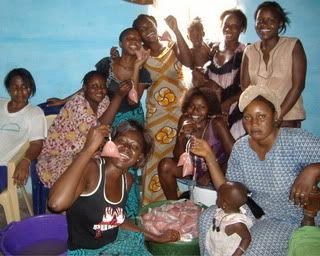On Wednesday Alexis and I began our bike trip to Velingara, the next major town to the west, about 150km from Kolda. We had an ominous start, delayed for an hour by a sudden thunder storm, but when we got on the road it was under a beautiful cool grey cloud cover.
On our first day biked to Adam's village, about 50k away. Upon arrival, dripping sweat, we stook turns bathing in his backyard. At night, when I have to get out of bed to use the toilet, I am delighted to have an indoor bathroom. The rest of the time I am deeply envious of the volunteers who have outoor restrooms. These are deep holes in the ground covered with a cement lid that has a wide hole it. Outdoor bucket baths under the wide Senegalese sky, with maybe a mango tree giving shade, are heavenly. You can hear village sounds such as women pounding grains in their large wooden pestles, and depending on the specific location, you can see sheeps grazing, fields of corn, or the folks in the next compound. It feels healthy and holistic to wash outside. After our baths we spent a long time lazing around. It wasn't the longest ride I've ever taken, but it was certain the one I was least prepared for, and I was beat. Eventually Adam took us on a walk to the nearest boutique, where we bought food and tea to give his family. The people out here love him. He jokes with them and gives out small monetary gifts like a beneficent mafioso. He his village's first volunteer, and locals are still stunned to meet other white people who speak Pulaar. After I did a few short greetings with one man, he told me that in fact I couldn't speak Pulaar. I agreed with him, in Pulaar, and went on to say how perceptive he was to know just by looking at me that I couldn't speak Pulaar, in Pulaar. He and his friends were soon laughing with me.
The next morning Adam took us to his villages rice fields. Beauty. The field is a long wide strip of knee deep water with a thick coat of bright green rice stalks on top, and it is surrounded by a landscape of grass, mango trees, and palm trees. I appologize for forgetting my camera. We tried to spot crocodiles, and eventually we leaned against a palm tree and enjoyed the birds's songs and the landscape of solid green, save the guy climbing trees to harvest palm wine. He uses an oval made of bamboo. He gets into the oval with the tree, each at an opposite end, and he uses the bamboo to support him as he leans back and shimmies up the tree.
Our second day of biking felt easier than the first. Our bodies were kind to us, learning that biking for hours was simply something we did, and not something to ache about. We talked about everything under the sun, played twenty questions, and told each stories and ideas we've had. Our road food became sandwiches. Every reasonably sized town on the road has a lady sitting under a shade structure selling bread, and if she didn't have the other ingredients that we wanted, we could buy them from a boutique or send a kid to do that for us. Alexis ate egg sandwiches and I had bread and margerine, and I added slices of cucumbers that I bought from passing kids. We drank kinkiliba, a local sweet tea. It is Ramadan, and many people are fasting, so instead of sitting with the vendor under the shade structure, we volunteered to hide, and would get ushered into a small tin-roofed room or a tent.
The road between Kolda and Velingara has a stunning collection of potholes, and most of them are gathered together between Adam's village and Koun Kane. Often they are so close together that only thin strips of pavement are left, like balance beams. The holes are routinely a foot deep, so biking straight and taking the bumps would be nearly impossible. Beside of the road the dirt has been pounded into a series of steep and tightly packed hills or waves, so that twisting and turning through the balance beams is the best option. A motorcyclist passed us, and I was comforted by how long it took him to get out of our sight. There is no getting good at handling these roads.
Everyone whom we passed called out cheerful greetings and asked where we were going. They looked at us like we were crazy when we told them how far we intended to go. Occasionally we caught up with another bicyclist, and he or she would chat with us about the quality of the road, the weather, and where we were all coming from.
Late in the afternoon two boys came barreling down the road so fast that they could not keep their feet on their bicycle pedals. One passed us, and the other swerved to our side of the street. Alexis dodged him, but he smashed into my front wheel, and once again I went flying onto the cement. This time I took the momentum of the fall and rolled once on the ground with it. When I stood up my left arm and knee hurt, but not nearly as bad as after my other accidents. A result of rolling? We were immediately surrounded by twenty little kids and a few adults who seemed to materialize out of thin air. The boy who hit me chuckled an appology, and his mother kept telling me, "it was a small, very small, silly little accident, yes?" as she grinned hopefully. When I told them I was fine they seemed deeply relieved. I wonder if they were afraid of me. After we had biked out of sight we stopped to examine my scrapes. Alexis gave me chocolate. We resumed our pedaling.
Our destination was Koun Kane, and where there is no sign on the east side of town. The sun had nearly set when we entered a town that had no name. Alexis called Kate, our host for the night, and reckoned we had another fifteen minutes at least. We got onto our bikes and took off as fast as we could, and about ten feet after our start we heard Kate and Evelina calling our names. They bought us sodas and were soon resting, deeply relieved. An old lady saw us exhausted, asked about our trip, and then merrily fanned us with her head scarf. After a short rest, the four of us rode out to Evelina's village. She lives about thirty minutes out of town on a dirt road. It's ordinarily a pleasant bike ride, with fields and forests everywhere you look. But we were biking after dark, a thunder storm was rolling in, and we only had two flashlights, so after a spell of slow biking we got off and walked, comically slipping and sliding on the mud, and arriving thoroughly drenched.
Evelina and Kate live in villages a kilometer apart. Volunteers debate the wisdom of such close assignments. It can be glorious when the volunteers are compatable and the villagers understanding, but it can be dreadful if the volunteers are not friends and the villagers do too much comparing of the two. Luckily, Kate and Evelina get along well, and talking about work and social situations has made things easier for both.
We spent the night in Kate's hut, and her village gave us one of the most delicious meals I have had in Senegal. Kate and the villagers are fasting, so the evening meal is a cause for rejoicing, and they did so this night by making a dish of beans to be eaten with bread and a peaunt sauce to be eaten with rice. It was too dark and we were too tired to do much besides eating dinner and falling into bed.
The next morning we biked to Kristal's village. Kristal has a unique location, almost 20km off a paved road. I think there was a time when many volunteers had settings like this, but nowadays most village volunteers are far closer to markets and easy transportation. I love her village. It is tiny, with maybe 200 people. She is the second or third volunteer to live here, so her villagers are fairly used to white people. I think because of the small population and the fact that everyone knows one another, there is a higher standard for behavior. The name calling and teasing that white people receive daily in cities does not happen in small villages.The villagers were so friendly and easy going. At one point Kristal's father called her outside specifically to tell her not to do any work today, just to sit with us, and not to let us do anything either, for we must rest after our long ride. After a long time catching up in her hut, walked to the field to see where she had planted trees, and then sat outside with her family. In training last year an older volunteer told us she felt like a pioneer woman from a century ago, traveling for a full day to visit friends, and then doing nothing but talking throughout the visit, and maybe a little knitting. Indeed. It was idyllic. This is what I pictured when I imagined Peace Corps.
We left Kristal's village at sunrise and biked out to the paved road. On the way we passed some men from Guinea-Bisau who were making coal and shoveling it into rice bags to take to market. Charcoal is probably the most common cooking implement, with wood and gas stoves coming in distant seconds. Shortly after Alexis and I began the final leg of our journey towards Velingara we decided to scrap it. Velingara held no alure for us besides it being the place to get a car back to Kolda. So we decided to forego bragging rights in favor of giving our bodies a break, and we started sticking out our thumbs. We were hoping for an air-conditioned NGO SUV, but the first car to stop for us was a beat up sept-place, or a station wagon, a common mode of travel. Ordinarily these cars are full, but this one happened to have two vacancies. The driver told us he was only going part way to Kolda, and initially I told him we did not want the ride, because getting dropped in a small town would force us into a small bus for the remainder of the journey. The small busses have the advantage of letting your hips and knees sit at right angles, but they look more rickety, and they lay tipped beside roads far more often than dosept-places. The chauffeur promised that if there were no other cars going to Kolda, he would make the trip, so we strapped our bikes to the roof and got in. There was no car in the small town bound for Kolda, but our chauffeur was as good as his word. It took four hours for the car to fill up. While we waited Alexis had an egg sandwich, and I had a potato spaghetti stirfry at a roadside table where a man was cooking over a gas stove. Then we lay on a bench and read. It was a slow and sweet end to our trip.


